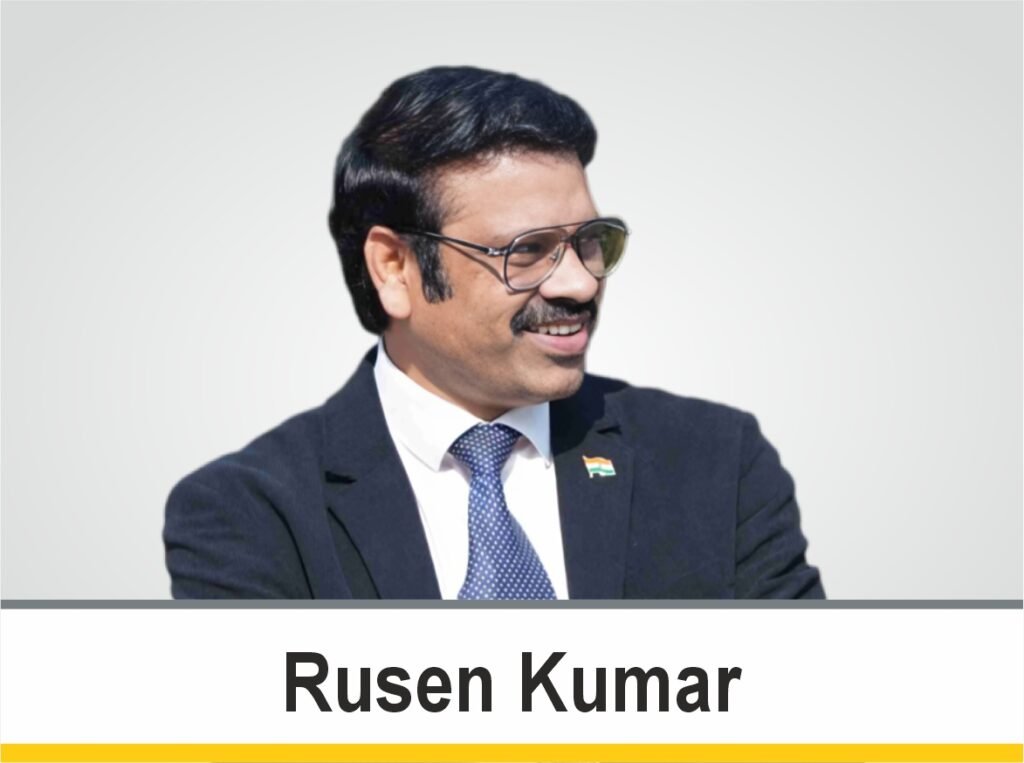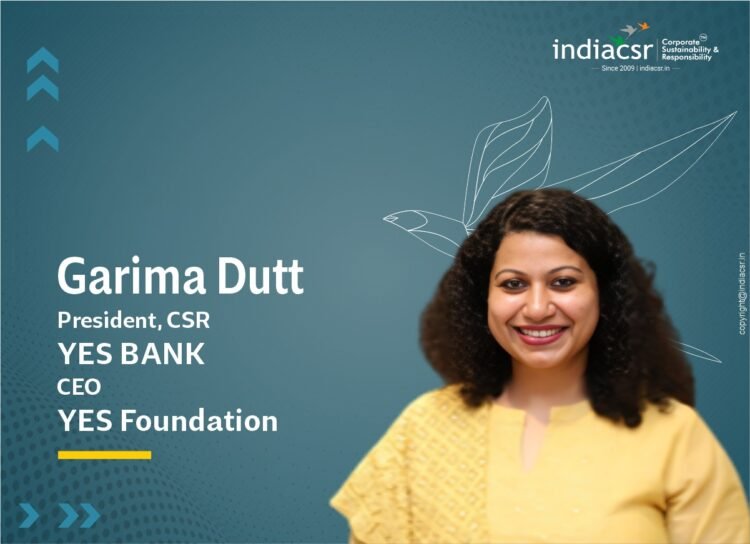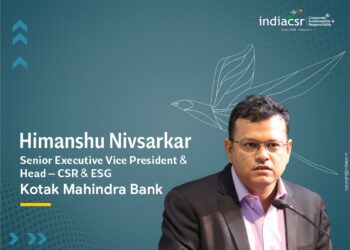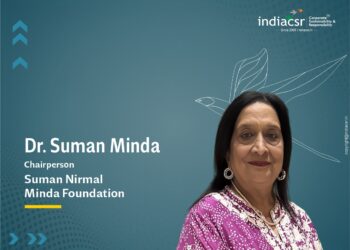Empowering India’s Future: A Conversation with Garima Dutt on YES Foundation’s Role in Social Impact

By Rusen Kumar
NEW DELHI (India CSR): Garima Dutt, the President of CSR at YES BANK and CEO of YES Foundation, is at the forefront of transforming social responsibility into impactful, scalable initiatives that empower communities and foster sustainable development across India. With a deep commitment to addressing critical societal challenges such as climate change, income inequality, and skill gaps, YES Foundation, under her leadership, has pioneered several programs aimed at improving livelihoods, promoting environmental sustainability, and fostering entrepreneurship in rural and underserved communities. In this in-depth interview, Garima shares insights into how YES Foundation is shaping its mission to create lasting social change, the foundation’s flagship initiatives, and the strategic approach to scaling its impact. She also discusses her vision for the future of CSR in India, particularly in the banking and financial sectors, and how YES Foundation plans to evolve to meet the needs of an ever-changing landscape.
1. How do you envision YES Foundation role in driving social impact at scale and addressing critical societal issues?
YES Foundation is the social development arm of YES BANK, driven by a vision of an empowered and equitable India. It strives to address societal challenges like climate change, income inequality and skill gaps. Through projects such as skilling programmes for underprivileged youth, sustainable agricultural practices for farmers, and promoting rural entrepreneurship, the Foundation envisions strengthening livelihoods across urban and rural India. Its programme design ensures alignment with national priorities and Sustainable Development Goals (SDGs). In effect, the foundation is poised to play a catalytic role in driving social impact. Scalability and replicability is ensured through strong on ground partnerships.
2. What are the YES foundation’s flagship programmes, and how do they contribute to fostering sustainable development and social equity?
The flagship programmes of YES Foundation focusses on the 3Es: Employability, Entrepreneurship, and Environment Sustainability:
- Employability: Skilling programmes have trained over 10,000 underprivileged youth across six states, focusing on market-oriented job skills, soft skills, and digital literacy. At least 70% of trained individuals are placed in gainful employment, unlocking an economic potential of INR 30 crores last year.
- Entrepreneurship: Over 40,000 rural farmers, women and artisans enhanced their income through training in climate-resilient farming, access to irrigation, and nano enterprise development, unlocking an economic potential of INR 50 crores last year.
- Environment Sustainability: Over 3 lakh trees have been planted under our agroforestry project, contributing to green cover enhancement, as well as providing supplemental income to farmers. The project has a carbon sequestration potential of 1.7 lakh tonnes of CO2 over next 20 years.
3. How does YES Foundation measure the long-term success and impact of its initiatives, and what metrics are most important to you?
We use log frame analysis to evaluate the long-term success and impact of our initiatives. For project outcomes, we track metrics such as the number of farmers mobilized, watershed structures built, and individuals trained in entrepreneurship. To assess impact, we go further by measuring income enhancement directly attributable to our initiatives and examining how beneficiary families utilize this additional income. Throughout the project, we monitor gender balance, community participation, and environmental impact. However, the most critical metrics for us are social and economic empowerment, which are essential for ensuring the sustainability of impact beyond the project timeline.
4. How does the Foundation incorporate community feedback and needs into the planning and execution of its programs?
The Foundation emphasises a community-centric approach by engaging with beneficiaries and implementation partners. It identifies unique community needs, collaborates with local stakeholders, and incorporates insights into project design. Programmes are designed to be adaptive, reflecting real-time challenges and opportunities within communities. Community engagement is promoted at all stages of the project, to drive ownership, active involvement and by keeping long-term sustainability of the project in mind.
5. What are your top priorities for YES Foundation in the coming years, and how do you plan to scale its impact further?
The Foundation has committed to inspire the youth of India to lead economic and social development by skilling themselves for market-oriented jobs and by taking to enterprise. Towards this end, the Foundation is prioritising:
- Skilling 25,000 youth in market-oriented jobs by 2026.
- Strengthening rural economies by enhancing livelihood opportunities for 75,000 farmers, women, and artisans by 2026.
- Planting 1 million trees to address climate change and promote agroforestry by 2028.
- Scaling impact through partnerships with government bodies, NGOs, and corporates, leveraging collaborative efforts to amplify reach and effectiveness.
6. As a leader, how do you drive alignment between business goals and social impact in your CSR strategies?
At the Foundation, our work in livelihoods and environmental sustainability is closely aligned with YES BANK’s core values. We have seamlessly integrated CSR with the Bank’s brand identity, emphasizing the value of ‘Being Responsible,’ which is upheld by every employee. To foster engagement, we provide employees with opportunities to contribute to social causes, supported by a dedicated employee volunteering policy. Externally, we measure reputation metrics to ensure our brand ethos translates into meaningful inclusion and empowerment for communities.
7. How do you see CSR evolving in India over the next decade, particularly in the banking and financial sector?
CSR is constantly evolving. As we complete 10 years of CSR law this year, we see that common concerns and challenges are there for partners working in similar thematic areas and over the next decade, I clearly see more collaboration coming in to address these. This collaboration will span not only between corporates and NGOs or corporates and governments but multi-stakeholder platforms where different players will come together for achieving a common goal. We already are seeing examples of such collaborations being formed to address issues like river rejuvenation, restoring mangroves, etc.
Banking and Financial sector has effectively partnered to raise financial literacy across different segments and for unlocking credit for those who were traditionally considered “unbankable”. With its wide network of HNIs and mass affluent client base, there is also a clear potential to contribute to the social sector ecosystem by directing funding to create innovative and replicable models. Additionally, given the large skills base and multi-sectoral focus that the financial sector has, there is scope to contribute towards capacity building of the social sector players as well.
***
About Rusen Kumar
Rusen Kumar is a distinguished journalist, author, and visionary knowledge entrepreneur specializing in Corporate Social Responsibility (CSR) and sustainability in India. He is the founder and managing editor of India CSR Network, a leading platform dedicated to CSR and sustainability issues.
Copyright@IndiaCSR
Showcase your CSR achievements and share your insights with India’s leading CSR platform.
Contact us at biz@indiacsr.in I 9981099555 to feature your success stories and interviews.























